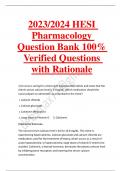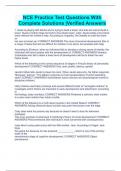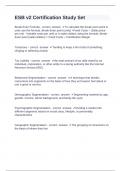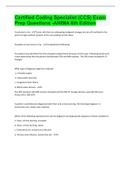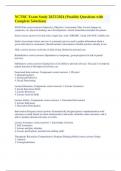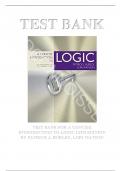and Final Exam) UPDATED 2024 Solved
100%
possiblea
psych
8/17/24
,Psych 323: Child Development (Midterm and Final Exam) UPDATED
2024 Solved 100%
Piaget's stages of cognitive development - sensorimotor, preoperational,
concrete operational, formal operational
sensorimotor - birth-2 years (Piaget)
-reflexes to goal directed activity
-from body to outside world
-development of object permanence
-from action to mental representation
preoperational - 2-7 years (Piaget)
-represent actions mentally
-no logical thought
-intuitive thought
-egocentrism
-lack of conservation
intuitive thought - asking why questions and thinking intuitively, but the
conclusions are based on unrelated facts (preoperational)
egocentrism - the difficulty to see the world from another's point-of-view
(preoperational)
lack of conservation - volume, mass, number (preoperational)
concrete operational - 7-12 years (Piaget)
-reversibility
-classification
-develop logical thinking, but not abstract though (ex. literal translations to
abstract phrases)
reversibility - the ability to reverse mental operations (concrete operational)
classification - organize object into hierarchal conceptual categories (ex. cats and
dogs are both in the category of animals) (concrete operational)
formal operational - 12 + years (Piaget)
-develop abstract thought (ability to think about hypothetical situations and
understand abstract concepts like justice)
-hypothetico-deductive reasoning
hypothetico-deductive reasoning - ability to form hypotheses about how the world
works and reason logically (formal operational)
imaginary audience - center of other people's attention most of the time
(resurgence of egocentrism in adolescence)
, Psych 323: Child Development (Midterm and Final Exam) UPDATED
2024 Solved 100%
personal fable - you are unique and different from other people (resurgence of
egocentrism in adolescence)
Critiques of Piaget - -ages and stages are not necessarily accurate (they are
rough estimates)
-stages aren't necessarily distinct from one another (child may be teetering
between 2 stages)
-his ideas don't stand up across cultures using western methods, but sometimes
do with non-western methods
theory of core knowledge - the theory that basic areas of knowledge are innate
and built into the human brain (contrasts with Piaget that cognitive development
arises through experiences
core areas of theory of core knowledge - 1. Knowledge that an object moves as a
cohesive unit, it doesn't contact another object unless it's close, and moves on a
continuous path
2. Knowledge that agents (people) act purposefully towards a goal
3. Knowledge (within limits) of number
4. Knowledge of spatial relationships
methods of testing theory of core knowledge - -object permanence test
-shows infants possible events vs. impossible events (sees which event the
infant looks at linger since babies look longer at something they don't expect to
see)
criticisms of object permanence test - requires 3 things:
1. remembering where the object was
2. plan from retrieval of the object
3.motor skills to grasp the object
-more than just knowing where the object is
-maybe the infant knows where the object is, but just isn't old enough to do these
things yet
-use eye tracking and object permanence test
-babies look longer at when ehe screen falls flat since it expect that the object
was there
-use of pupil dilation to measure surprise, but this could just be from movement
of the screen
Vygotsky's Sociocultural Theory - emphasis placed on the importance of earning
taking place in a social world
-zone of proximal development (ZPD)
-scaffolding
-private speech


